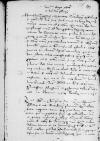Letter #1558
[Ioannes DANTISCUS] to Sigismund I JagiellonThorn (Toruń), 1536-11-26
Manuscript sources:
Auxiliary sources:
| ||||||||||||
Text & apparatus & commentary Plain text Text & commentary Text & apparatus Excerpts concerning Dantiscus' travels
Serenissima Regia Maiestas et Domine, domine clementissime. Humillimam perpetuae meae servitutis commendationem.
Quemadmodum Serenissima Maiestas Vestra cf.
Ex
